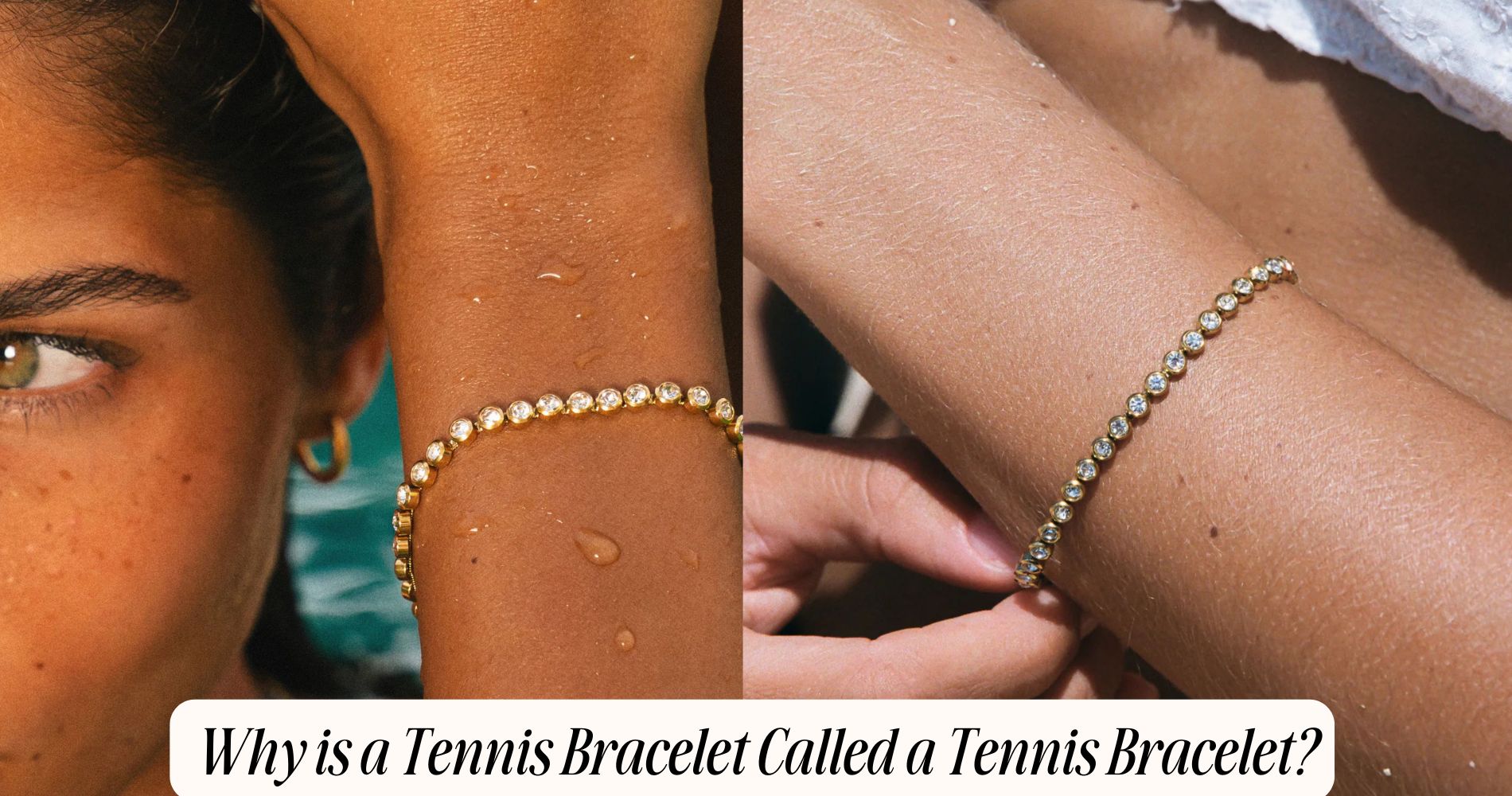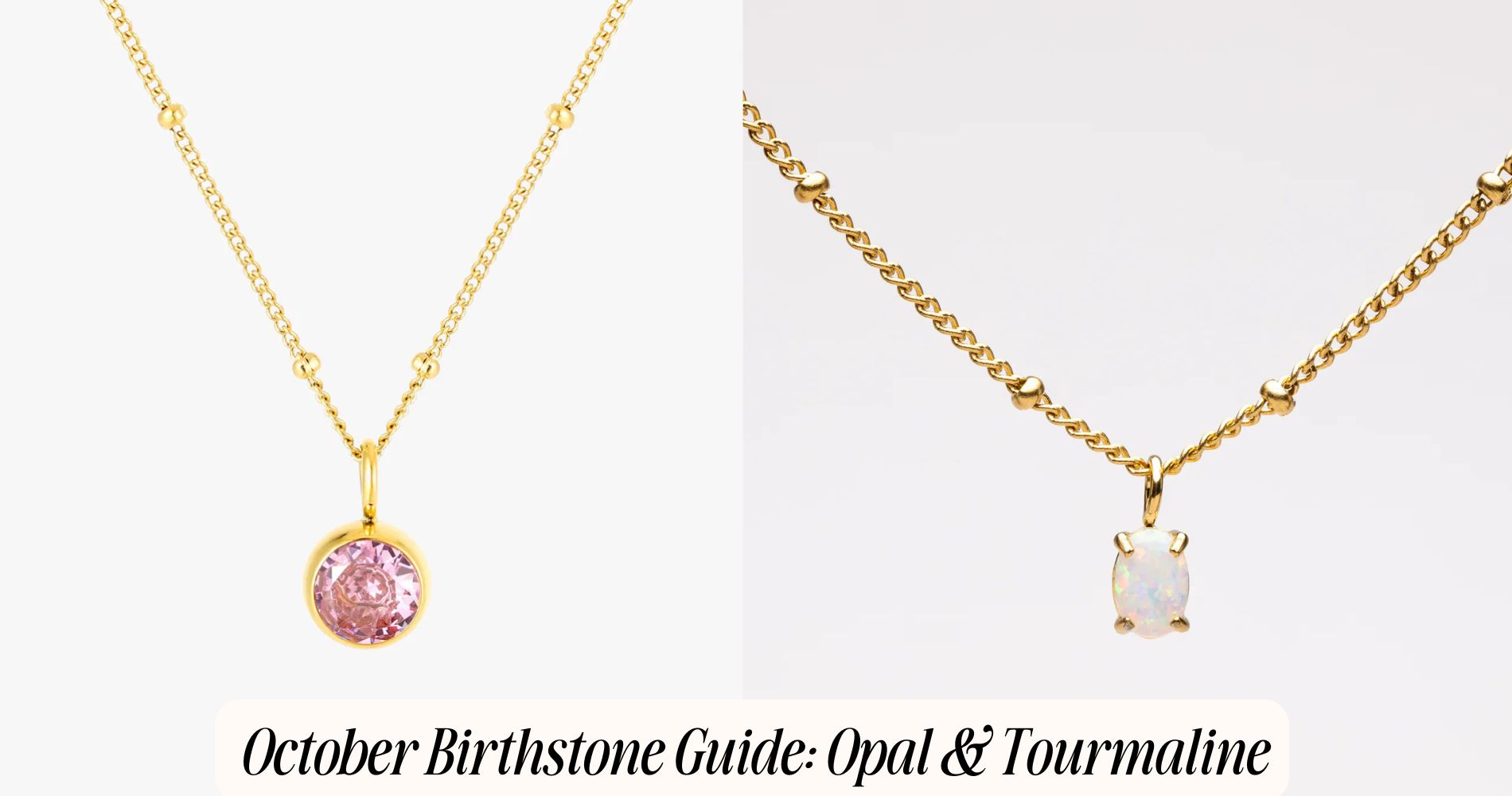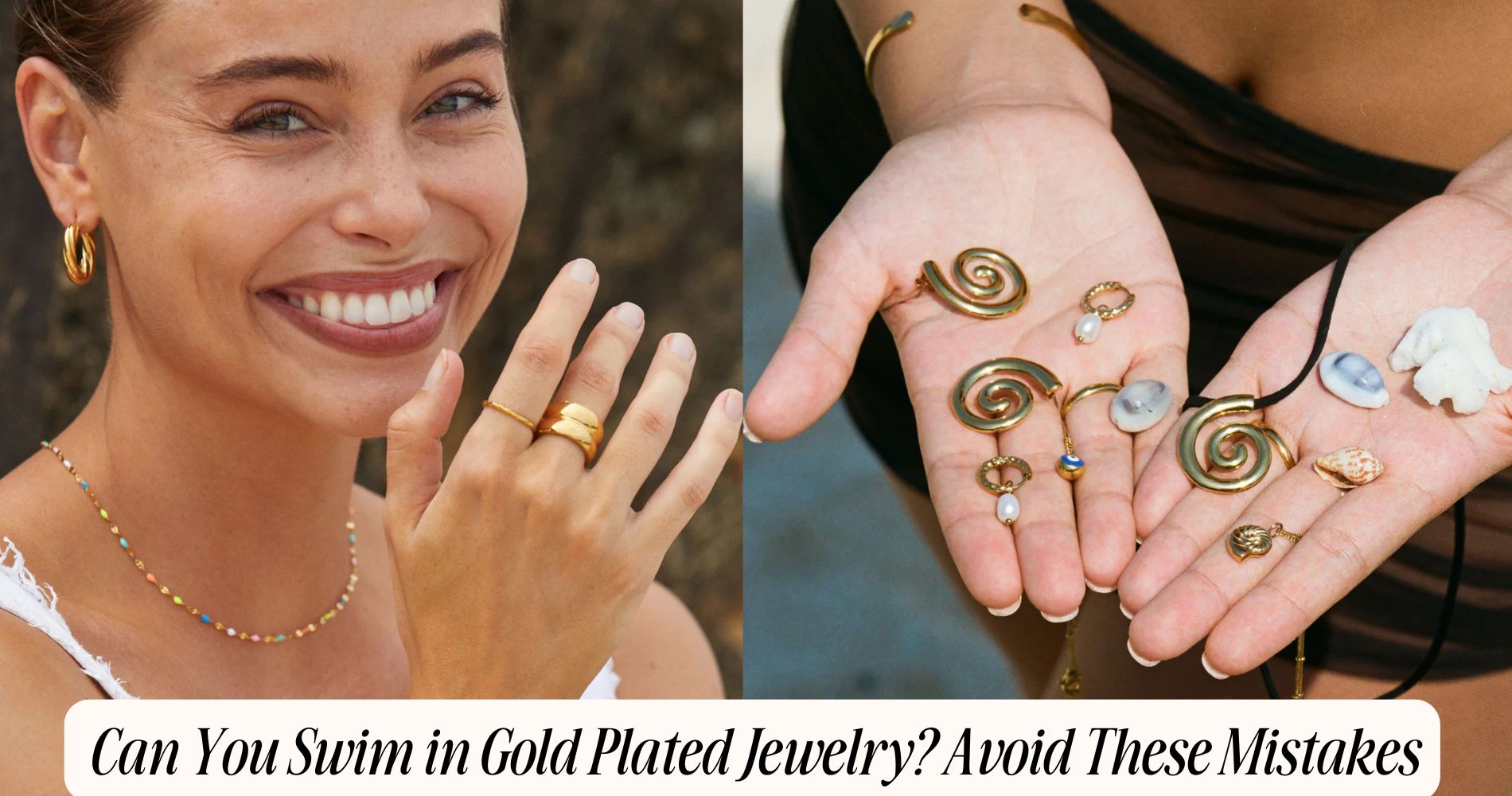
Why Is a Tennis Bracelet Called a Tennis Bracelet?
Have you ever wondered why is a tennis bracelet called a tennis bracelet? The name originated in the 1980s after a memorable incident involving tennis star Chris Evert. During a significant match at the US Open, her diamond bracelet fell off, capturing public attention and linking her elegant jewelry to the sport in a new way. Before this, the piece was known as an 'eternity bracelet.' This moment highlighted the intersection of style and athletics, reinforcing the bracelet's image as a sophisticated accessory. With its design featuring uniform gemstones that maximize brilliance, the tennis bracelet remains a timeless piece. Explore how this trend evolved and influenced modern jewelry styles further. You can also check out our Waterproof Bracelets collection to see how innovation and design meet durability in modern pieces.
Origin of the Name
The term "tennis bracelet" originated during a high-profile tennis match in the 1980s when professional player Chris Evert famously stopped a game to search for her lost diamond bracelet. This incident not only captured the attention of spectators but also highlighted the historical significance of the piece of jewelry. The term evolved from that moment, linking the bracelet to the sport itself, and creating a lasting association in popular culture.
Naming conventions in jewelry often reflect the context or events surrounding them, and the tennis bracelet exemplifies this phenomenon. Initially known as an "eternity bracelet," the piece was rebranded after Evert's incident. The new name resonated with the public, intertwining luxury with athleticism. This connection elevated the bracelet's status, making it a staple accessory for both athletes and fashion enthusiasts.
Evert's emotional search for her bracelet transformed a simple item into a symbol of grace and perseverance. Consequently, the tennis bracelet has become synonymous with elegance and a sense of timelessness, transcending its original purpose and solidifying its place in fashion history.
This evolution illustrates how a moment in sports can redefine naming conventions and influence trends in jewelry.
The 1987 US Open Incident
At the 1987 US Open, Chris Evert experienced a memorable moment that forever linked her to the tennis bracelet.
When her diamond bracelet slipped off during a match, it not only highlighted the delicate nature of such jewelry but also shifted the perception of elegance in sports.
This incident marked a turning point where jewelry began to lose its sparkle in the eyes of athletes, prompting a reevaluation of what was considered appropriate for the court.
Chris Evert's Iconic Moment
Tension and excitement electrified the atmosphere during the 1987 US Open, particularly when Chris Evert made headlines for an unexpected reason. As she battled on the court, her diamond tennis bracelet, a piece of jewelry that would soon become synonymous with her name, slipped off during a pivotal moment.
This incident not only showcased Evert's athletic prowess but also highlighted the intersection of tennis fashion and sport.
Evert's legacy in tennis extends beyond her impressive titles; she transformed how athletes approached style during competitions. Her choice to wear a delicate, yet striking bracelet while playing made a bold statement about combining elegance with athleticism.
The incident sparked widespread media attention, cementing the bracelet's place in popular culture and leading to the term "tennis bracelet" being coined.
This moment served as a reminder that tennis isn't just about the game; it's also about how players express themselves on and off the court.
As you reflect on Evert's impact, consider how her fashion choices continue to influence today's athletes, merging competitive spirit with personal style in ways that resonate across generations.
Jewelry Losing Its Sparkle
During the 1987 US Open, a seemingly simple incident involving Chris Evert's diamond bracelet highlighted the fragile relationship between jewelry and athletic performance. As Evert played, her bracelet clasp broke, causing her to stop mid-match to search for it. This moment underscored how even the most glamorous accessories could detract from athletic focus and functionality.
In the world of sports, jewelry can quickly lose its sparkle—not just physically, but regarding practicality. You need to take into account jewelry maintenance tips to keep your cherished pieces intact. Regularly checking clasps and settings can prevent mishaps like Evert's.
When it comes to restoring shine, gentle cleaning solutions and soft cloths can help maintain that dazzling appearance without causing damage.
This incident serves as a reminder that while tennis bracelets may symbolize elegance, they must also align with the demands of active lifestyles. Balancing aesthetics and practical upkeep is essential for any jewelry wearer, especially athletes who can't afford distractions.
In the end, Evert's bracelet became a symbol of the intersection between beauty and sport, reminding us that even the most elegant pieces require thoughtful attention.
Connection to Chris Evert
When you think about the tennis bracelet's rise to fame, Chris Evert's on-court incident during the 1987 US Open comes to mind.
This moment not only highlighted her elegance and style but also sparked a surge in popularity for the accessory, intertwining it with her legacy.
As you explore Evert's influence, you'll see how her connection to the bracelet transformed it into a symbol of sophistication in both sports and fashion.
Evert's On-Court Incident
Amidst the intensity of competitive tennis, Chris Evert's on-court incident stands out as a pivotal moment that encapsulated both her fierce drive and the unexpected challenges athletes face. During the 1987 US Open, a seemingly innocuous event occurred when Evert's diamond bracelet snapped, scattering jewels across the court. This incident not only disrupted the match but also highlighted the intersection of athleticism and on-court fashion—a key aspect of Evert's legacy.
The drama of the moment served to humanize Evert, revealing that even elite athletes can face unforeseen hurdles. It emphasized her grace under pressure as she calmly resumed play after retrieving the scattered gems. This incident became emblematic of Evert's ability to blend style with sport, as her choice of jewelry—specifically the diamond bracelet—became iconic and further entrenched her status in the world of fashion.
Evert's legacy extends beyond her remarkable tennis achievements; it includes her influence on how players present themselves on the court. The combination of her athletic prowess and her fashion choices makes her a lasting figure in both tennis and style, proving that sports and aesthetics can coexist beautifully.
Popularity From Tennis Match
The immense popularity of tennis matches, particularly during the era of Chris Evert, reveals how the intersection of sport and celebrity can captivate audiences. Evert, a tennis icon, not only dominated the court but also became a fashion trendsetter. Her on-court style, characterized by elegant yet practical tennis fashion, showcased her poise and athleticism, making her a role model for fans and aspiring players alike.
During a pivotal match in 1987, Evert wore a diamond bracelet that famously fell off mid-game. This incident sparked widespread interest in the piece, and soon after, the term "tennis bracelet" emerged. The bracelet's delicate design, featuring a continuous line of diamonds, resonated with the elegance of Evert's persona and became a staple in jewelry trends.
As audiences tuned in to watch Evert's matches, they also became enamored with her style choices, including the now-iconic tennis bracelet. The fusion of sport and fashion allowed this piece of jewelry to transcend its original context, cementing its place as a symbol of sophistication and athletic grace.
Today, the tennis bracelet remains a timeless accessory, forever linked to Evert's enduring legacy in both sports and style.
Evolution of Jewelry Trends
Jewelry trends have always reflected the dynamic interplay of culture, technology, and personal expression. As you explore the trends evolution in jewelry history, you'll notice how each era introduces distinctive styles that often mirror societal values and advancements.
For instance, the Art Deco period celebrated geometric designs and bold colors, showcasing a shift towards modernism and individuality.
In the mid-20th century, the rise of synthetic materials revolutionized jewelry making, allowing for more affordable and diverse options. You can see this influence in how costume jewelry gained popularity, making fashion accessible to a broader audience.
With the advent of technology, the way consumers shop for jewelry has transformed as well. Online platforms have democratized access, enabling trends to spread rapidly across borders.
Today, minimalist designs often dominate, reflecting a contemporary emphasis on simplicity and sustainability.
Every trend you observe isn't just about aesthetics; it's a narrative of human experience. Understanding the evolution of these trends grants you insight into how jewelry serves not only as an adornment but also as a reflection of collective identity and personal storytelling throughout history.
Cultural Impact and Popularity
Throughout history, countless cultures have embraced the tennis bracelet as a symbol of elegance and status. Its cultural significance extends beyond mere adornment, representing a connection to wealth and sophistication that resonates in various social settings. When you wear a tennis bracelet, you're not just showcasing a piece of jewelry; you're also making a statement about your social status.
This bracelet gained popularity in the 1980s, particularly after Chris Evert famously lost hers during a match, which caught the public's attention. Since then, it has become a must-have accessory for those who wish to exhibit their refined taste.
The continuous association with high-profile events and celebrities further cements its status as a luxury item.
In different cultures, the tennis bracelet often signifies milestones—such as anniversaries or significant achievements—making it a meaningful gift. Wearing one can elevate your appearance, subtly communicating your appreciation for fine jewelry and your place within the social hierarchy.
Design and Characteristics
A tennis bracelet typically features a delicate, flexible chain adorned with a line of uniform gemstones, usually diamonds, that create a continuous sparkle around the wrist. This elegant design not only enhances the overall aesthetic but also symbolizes sophistication and luxury.
The gemstones are often set in a manner that allows light to pass through, maximizing their brilliance and fire, which contributes to the bracelet's allure. You'll notice that tennis bracelets often employ a secure clasp, ensuring they stay in place during both everyday wear and special occasions.
Their timeless characteristics make them versatile pieces that can be worn alone or stacked with other jewelry for a more layered look. The simplicity of the design allows it to complement a wide range of outfits, from casual to formal.
Furthermore, the uniformity of the stones creates a harmonious appearance that appeals to various tastes. The choice of diamonds, while classic, can be substituted with other gemstones for a personalized touch.
Ultimately, a tennis bracelet's combination of elegance, durability, and adaptability has solidified its status as a staple in jewelry collections worldwide.
Modern Interpretations and Styles
You might be surprised to see how tennis bracelets have evolved in modern fashion, embracing innovative designs and diverse materials. Today, these bracelets are no longer confined to the classic diamond line; instead, they showcase a myriad of modern designs that cater to various tastes.
You'll find options featuring colorful gemstones, mixed metals, and even unique shapes that break away from traditional expectations. This evolution has led to numerous bracelet variations, allowing you to express your personal style more freely.
For instance, some contemporary designs incorporate flexible links or adjustable clasps, enhancing comfort and wearability. Others may blend the classic aesthetic with modern twists, like asymmetry or layering techniques, making the tennis bracelet a versatile accessory for any occasion.
Moreover, modern interpretations often focus on ethical sourcing and sustainability, appealing to the environmentally conscious consumer. Whether you're dressing up for a formal event or adding flair to your everyday outfit, today's tennis bracelets have something to offer for everyone.
Frequently Asked Questions
Are Tennis Bracelets Suitable for Everyday Wear?
Yes, tennis bracelets are perfect for everyday wear. Their blend of everyday elegance and versatility makes them ideal for casual occasions, allowing you to effortlessly elevate your style while maintaining comfort and simplicity in your daily outfits.
How Do You Properly Care for a Tennis Bracelet?
To properly care for your tennis bracelet, use gentle cleaning techniques like a soft cloth and mild soap. Store it in a padded box to prevent scratches and keep it away from extreme temperatures and humidity.
Can Tennis Bracelets Be Custom Designed?
Yes, tennis bracelets can be custom designed. You can explore various custom design options to create personalized styles that reflect your unique taste, combining different gemstones, metals, and settings to achieve the perfect look for you.
Conclusion
Essentially, the tennis bracelet's name stems from a pivotal moment in sports history, where Chris Evert's on-court mishap transformed a simple piece of jewelry into a symbol of elegance and resilience. This blend of athleticism and style not only redefined jewelry trends but also cemented its cultural significance. Today, the tennis bracelet continues to evolve, reflecting contemporary aesthetics while honoring its rich legacy, making it a timeless accessory cherished by many.
























Leave a comment
This site is protected by hCaptcha and the hCaptcha Privacy Policy and Terms of Service apply.